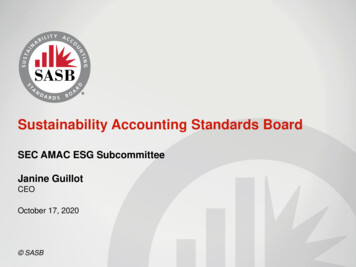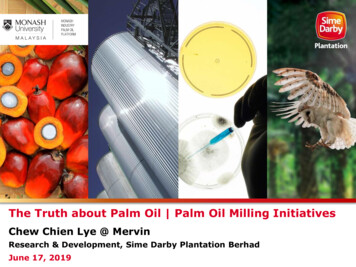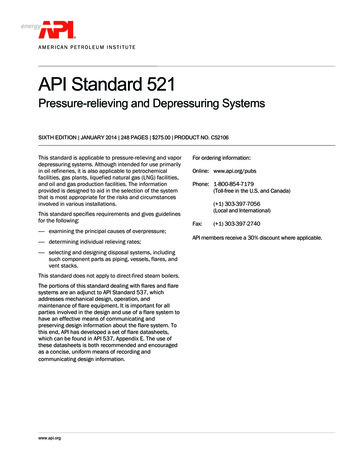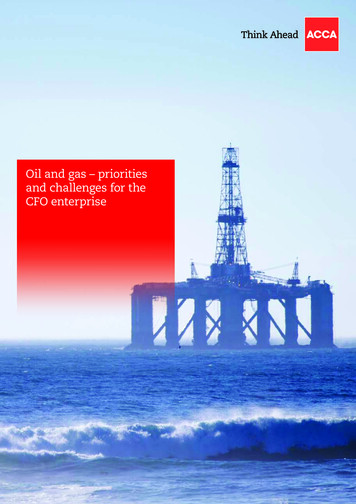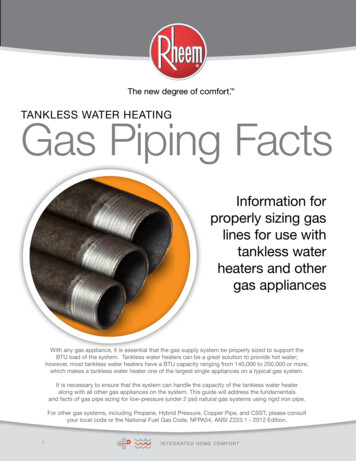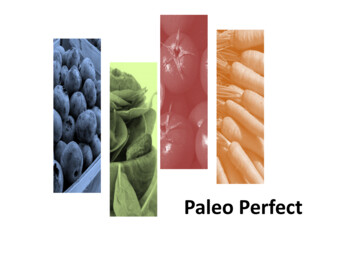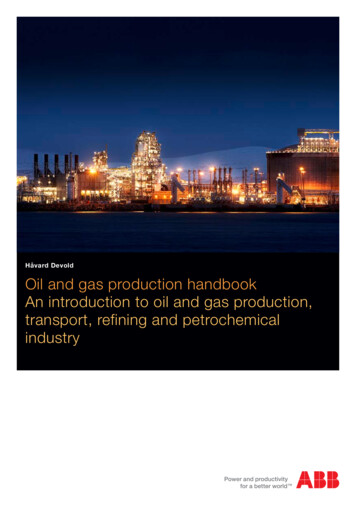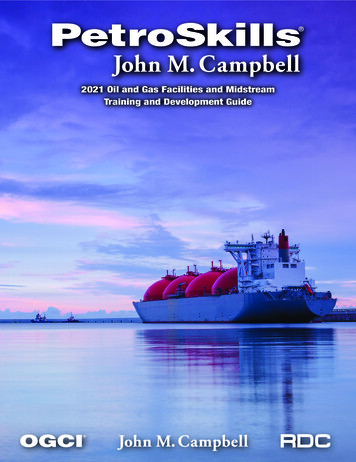
Transcription
2021 Oil and Gas Facilities and MidstreamTraining and Development Guide
Message from the CEOA competent workforce has always been critical for ourindustry’s success.This guide presents the industry’s most comprehensiveworkforce development programs – focused on buildingcompetent people. PetroSkills brings together industry-drivenand industry-approved programs that deliver flexible, practical,fit-for-purpose training and development. This guide can helpyou find ways to advance your technical competence and buildyour company’s value.Since the first offerings of Production Operations 1 and the Campbell Gas Course over 52 years ago, PetroSkills instructor-led training programs have set the standard forexcellence from subsurface to downstream. This guide presents hundreds of sessionsoffered worldwide by top industry experts in each technical discipline across the valuechain. Our competency-based programs are designed and delivered under the directionof the PetroSkills Alliance which includes some of the top petroleum companiesworldwide, working together, to offer an industry-driven and vetted set of courses,products and services.In addition to our instructor-led programs, our digital learning solutions andprofessional services continue to lead the industry; see page 3 for more details.Also, we are excited to announce that we have expanded our capabilities in operatortraining by acquiring Simulation Solutions Inc. This allows us to offer you a dynamiclibrary of hands-on simulator training for console and outside operators. See petroskills.com/ssi for details.We are proud that our blended/virtual learning program, PetroAcademy , continuesto grow. This unique course model delivers the same competency development as ourface-to-face courses via virtually delivered Skill Modules , available from anywhere inthe world.Two important blended/virtual courses have been added to our extensive library, andwe will be adding more throughout 2021. 4 Course Progression MapGAS PROCESSING6667777PROCESS FACILITIES1081110988108119991091111Basics of Rotating Mechanical Equipment - page 14Basics of Static Mechanical Equipment - page 14For a full list of blended/virtual courses, see the back cover, or petroskills.com/blended.I hope you find this guide useful. If there is any way that we can help you, your team,or your organization, please don’t hesitate to contact me personally at ford.brett@petroskills.com, or contact our Customer Service Department at 1.918.828.2500.Gas Conditioning and Processing (Campbell Gas Course ) – G4Gas Conditioning and Processing Principles - G3 (Virtual/Blended course)Gas Conditioning and Processing – LNG Emphasis – G4 LNGGas Treating and Sulfur Recovery – G6LNG Short Course: Technology and the LNG Chain – G29Overview of Gas Processing – G2Practical Computer Simulation Applications in Gas Processing – G5Applied Water Technology in Oil and Gas Production – PF21Choosing the Right Facilities Equipment for the Reservoir – PF3CO2 Surface Facilities – PF81Fundamental and Practical Aspects of Produced Water Treating – PF23Fundamentals of Process Safety - PS2Introduction to Oil and Gas Production Facilities – PF2Oil Production and Processing Facilities – PF4Oil Well Pad Facilities (for Facilities Engineers) – OWPF-FEOil Well Pad Facilities (for non-Facilities Engineers) – OWPF-NFEOnshore Gas Gathering Systems: Design and Operations – PF45Process Safety Engineering – PS4Process Safety Engineering Fundamentals - PSF (Virtual/Blended course)Process Safety Engineering Principles - PSE (Virtual/Blended course)Relief and Flare Systems – PF44Risk Based Process Safety Management – HS45Troubleshooting Gas Processing Facilities - PF49GTroubleshooting Oil Processing Facilities - PF49OINSTRUMENTATION, CONTROLS & ELECTRICAL12121212Electrical Engineering Fundamentals for Facilities Engineers – E3Flow and Level Custody Measurement – IC73Instrumentation and Controls Fundamentals for Facilities Engineers – IC3Instrumentation, Controls and Electrical Systems Overview for Non-Electrical . . . .Engineers – ICE2113 Practical PID Control and Loop Tuning – IC74MECHANICAL ENGINEERINGFord BrettCEO, PetroSkills14 Basics of Rotating Mechanical Equipment - BRM (Virtual/Blendedcourse)14 Basics of Static Mechanical Equipment - BSM (Virtual/Blendedcourse)15 Compressor Systems - Mechanical Design and Specification – ME4614 Corrosion Management in Production/Processing Operations – PF2215 Fundamentals of Pump and Compressor Systems – ME4415 Mechanical Specification of Pressure Vessels and Heat Exchangers – ME4314 Piping Systems - Mechanical Design and Specification – ME41
TABLE OF CONTENTSPROCUREMENT/SUPPLY CHAIN MANAGEMENTPIPELINE ENGINEERING16 Offshore Pipeline Design and Construction – PL4316 Onshore Pipeline Facilities - Design, Construction and Operations – PL4216 Terminals and Storage Facilities – PL44OFFSHORE & SUBSEA17171717Flow Assurance for Offshore Production – FAOPFundamentals of Offshore Systems Design and Construction – OS4Overview of Offshore Systems – OS21Overview of Subsea Systems – SS2PRODUCTION AND COMPLETIONS ENGINEERING19 Gas Production Engineering – GPO18 Production Operations 1 – PO1 (Also available as a Virtual/Blended course)18 Production Technology for Other Disciplines – PTO (Also available as a Virtual/Blended course)18 Surface Production Operations – PO3127 Contracts and Tenders Fundamentals – SC4127 Cost/Price Analysis and Total Cost Concepts in Supply Management – SC6427 Effective Materials Management – SC4227 Inside Procurement in Oil and Gas – SC6127 Strategic Procurement and Supply Management in the Oil and Gas Industry– SC6227 Supplier Relationship Management – SC63PROJECT MANAGEMENT29 Advanced Project Management – FPM6229 Advanced Project Management II – FPM6330 Advanced Project Management Workshop - APMW30 Construction Management for the Project Professional - FPM6428 Managing Brownfield Projects – FPM4228 Petroleum Project and Program Management Essentials - P3ME30 Petroleum Project Changes and Claims Workshop - PPCC28 Petroleum Project Management: Principles and Practices – PPM29 Project Controls for Capital Projects - PC2128 Project Management for Engineering and Construction – FPM2229 Turnaround, Shutdown and Outage Management – TSOMOPERATIONS & MAINTENANCE20 Amine Sweetening and Gas Dehydration for Operations and Maintenance- OT4121 Applied Maintenance Management – OM2120 Crude Oil Pipeline Operations – OT5020 LNG Facilities for Operations and Maintenance – OT4321 Maintenance Planning and Work Control – OM4120 NGL Extraction, Stabilization and Fractionation for Operations andMaintenance - OT4220 Oil and Gas Processing Facilities for Operations and Maintenance – OT121 Process Plant Reliability and Maintenance Strategies – REL521 Turnaround, Shutdown and Outage Management – TSOMHEALTH, SAFETY, ENVIRONMENT23 Spill Control and Remediation Engineering - SCREPETROLEUM BUSINESS2625252424252526Advanced Decision Analysis with Portfolio and Project Modeling – ADACost Management – CMEconomics of Worldwide Petroleum Production – EWPEssential Leadership Skills for Technical Professionals – OM23Expanded Basic Petroleum Economics – BECManaging Non-Technical Risks - MNTRPetroleum Finance and Accounting Principles – PFAPetroleum Risk and Decision Analysis – PRDAny course is available in-house at your location. Contact us today.MULTI-DISCIPLINE TRAINING32323232Basic Petroleum Technology Principles – BPT (Virtual/Blended course)Basic Petroleum Technology – BPTOverview of the Petroleum Industry – OVPOperations Crew Resource Management - OCRM34INSTRUCTOR BIOGRAPHIESPETROSKILLS SPECIAL FEATURES2 PetroSkills Alliance3 PetroSkills Solutions - Competency Development4 Facilities Course Progression Map16 ePilot - Midstream Operations and Pipeline e-Learning19 In-House Training22 ePilot Online EHS Course Library24 Email Sign Up30 Email Sign Up31 Petroleum Professional Development Courses15 PetroSkills Conference Center33 Online Learning - ePilot and ePetroInside Back Cover Contact and Registration and Terms and ConditionsInside Back Cover CEU/PDH CertificatesBack Cover PetroAcademy - Blended Learning Solutions 1.918.828.2500 petroskills.com 1.800.821.5933 (toll free North America)
The Alliance is the AdvantageThe PetroSkills Alliance was founded in 2001 by Shell, BP and OCGI, to provide “important but not unique”competency-based training to the oil and gas workforce. Alliance members are provided opportunities tocollaborate around challenges facing organizational competency and workforce development.Alliance benefits include:FULL SPECTRUM ofLEARNING RESOURCESAccessAccess instructor-ledinstructor-led training,training,e-Learning,e-Learning, oror blendedblendedlearninglearning activities.activities.GLOBAL BENCHMARKS andSHARED BEST PRACTICESLeverageLeverage processesprocesses andand networksnetworkstoto alignalign withwith strategicstrategic NING andSHARING NETWORKSSpeedSpeed timetime toto solutionssolutions throughthroughregionalregional workshops,workshops, learninglearning forums,forums,andand communitycommunity ofof practice.practice.COMPETENCY DEVELOPMENTand ASSURANCECommonCommon methodologymethodology andand toolstoolsassureassure industryindustry widewide criticalcritical skills.skills.The PetroSkills Alliance spans the full energy value chain. Member companies include:
Our Approach to Workforce DevelopmentOur Approach to Workforce DevelopmentNeeds nsDOCUMENTATIONDOCUMENTATIONSKILLS GAPANALYSISSKILLS ATIONPLANIMPLEMENTATION &StrategicStrategicgningan nninPlaPlenAts&t&suArasnsuranureenmsueraesmaece ceMMNeeds Assessment&cynet ypeencmLearCo etning Solutions & ompLearCning Solutions &As a trusted advisor to the industry for over 50 yearsAs a trustedadvisor to thefor t 50ouryearsclients face every day.PetroSkills understands the challenges that our clients face every day.We can help:We can help: Bridge knowledge gaps in your workforce and develop an enterprise-wide training standard Bridge knowledge gaps in your workforce and develop an enterprise-wide training standard Accelerate time to competency for Engineers, Project Managers, Operators, and Technicians Accelerate time to competency for Engineers, Project Managers, Operators, and Technicians Assureyour regulatoryandandcompliancedemandsAssurethethe integrityintegrity ofof chnologytechnologytotoprovideprovidea has thethe experts,experts, schallenges,development plan.plan. WeWe enableenable veness, achieveachieve complianceoperations.Withourourdeepand deepindustryindustry experienceexperience andis entdevelopment omFor more informationor visit ourour .petroskills.com/solutions
4Facilities Course Progression MapOil and Gas ProcessingOil / nstrumentation,Controls & ElectricalElectricalInstrumentation& ControlsOffshore& SubseaPipelineEngineeringCO2 SurfaceFacilities – PF81p.12IntermediateGas Treating andSulfur Recovery– G6 p.7Practical ComputerSimulationApplications in GasProcessing – G5p.7Onshore GasGathering Systems:Design & Operation– PF45 p.11TroubleshootingGas ProcessingFacilities – PF49Gp.11Practical PIDControl and LoopTuning – IC74 p.13TroubleshootingOil ProcessingFacilities – PF49Op.11SeparationEquipment Selection & Sizing– PF42 (See website)Oil Well Pad Facilities(For FacilitiesEngineers)– OWPF-FE p.10Risk BasedProcess SafetyManagement– HS45 p.9Applied WaterTechnology in Oiland Gas Production– PF21 p.10Fundamentals ofProcess Safety– PS2 p.9Flow Assurancefor OffshoreProduction – FAOPp.17Terminals andStorage Facilities– PL44 p.16Process SafetyEngineering – PS4p.9Fundamental andPractical Aspectsof Produced WaterTreating – PF23p.10FoundationFlow andLevel CustodyMeasurement– IC73 p.12Relief and FlareSystems – PF44p.10Fundamentals ofOffshore Systems:Design andConstruction– OS4 p.17ElectricalEngineeringFundamentals forFacilities Engineers– E3 p.12Instrumentationand ControlsFundamentals forFacilities Engineers– IC3 p.12Offshore Pipeline Designand Construction – PL43 p.16Corrosion Management in Production/Processing Operations – PF22 p.14Oil Production and Processing Facilities – PF4 p.8Gas Conditioning and Processing - LNG Emphasis – G4LNG p.6Gas Conditioning and Processing – G4 p.6BasicGas Conditioning and Processing Principles – G3 Virtual/Blended Course p.6LNG Short Course:Technology and theLNG Chain – G29p.7Overview of GasProcessing – G2p.7Oil Well Pad Facilities(For Non-FacilitiesEngineers)– OWPF-NFE p.8Introduction to Oil and GasProduction Facilities – PF2 p.8Overview ofSubsea Systems– SS2 p.17Choosing the RightFacilities Equipmentfor the Reservoir –PF3 p.8Process SafetyEngineeringPrinciples – PSEVirtual/BlendedCourse p.9Instrumentation, Controls and ElectricalSystems Overview for Non-ElectricalEngineers – ICE21 p.12Onshore PipelineFacilities: Design,Construction andOperations – PL42p.16Overview ofOffshore Systems– OS21 p.17
Facilities Course Progression MapMechanical EngineeringNon-RotatingRotatingCompressorSystems Mechanical Designand Specification– ME46 p.15ReliabilityOperations& t.Advanced ProjectManagement II– FPM63 p.29Construction Mgmtfor the ProjectProfessional– FPM64 p.30Advanced ProjectMgmt Workshop APMW p.30ProjectManagement forEngineering andConstruction– FPM22 p.28Piping Systems Mechanical Designand Specification– ME41 p.14Project Controls forCapital Projects- PC21 p.29Turnaround, Shutdown, and Outage Management – TSOM p.21Fundamentalsof Pump andCompressorSystems – ME44p.15Procurement/Supply ChainManagementAdvanced ProjectManagement– FPM62 p.29Petroleum ProjectChanges and ClaimsWorkshop– PPCC p.30ManagingBrownfield Projects– FPM42 p.28MechanicalSpecification ofPressure Vesselsand HeatExchangers– ME43 p.15Petroleum ProjectManagement:Principles andPractices – PPMp.28Process PlantReliability andMaintenanceStrategies– REL5 p.21Cost/Price Analysisand Total CostConcepts in SupplyManagement – SC64p.27SupplierRelationshipManagement– SC63 p.27StrategicProcurement andSupply Managementin the Oil and GasIndustry – SC62p.27Inside Procurementin Oil & Gas – SC61p.27Additionalcoursesavailable in:Amine Sweeteningand Gas Dehydrationfor Operations &Maintenance– OT41 p.20Production &CompletionsNGL Extraction,Stabilization andFractionationfor Operations &Maintenance– OT42 p.20p. 18-19Crude OilPipelineOperations– OT50 p.20MaintenancePlanning andWork Control– OM41 p.215LNG Facilitiesfor Operations &Maintenance– OT43 p.20EffectiveMaterialsManagement– SC42 p.27Petroleum Projectand ProgramManagementEssentials – P3MEp.28Contractsand TendersFundamentals– SC41 p.27Health,Safety,Environmentp. 22-23PetroleumBusinessp. 24-26ProfessionalPetroleumDevelopmentp. 31Basics of StaticMechanicalEquipment– BSM p.14Basics of RotatingMechanicalEquipment– BRM p.14AppliedMaintenanceManagement– OM21 p.21Oil & GasProcessing Facilitiesfor Operations &Maintenance – OT1p.20Managing NonTechnical Risks– MNTRp.25MultiDisciplineTrainingp. 32
GAS PROCESSING6Gas Conditioningand ProcessingPrinciples – G3BASIC52 HOURSPetroAcademyGas Conditioning and Processing – G4The Campbell Gas Course Gas Conditioning andProcessing – LNGEmphasis – G4 LNGFOUNDATIONFOUNDATION10-DayThe Campbell Gas Course has been the standard of the industry for more than 52 years.Tens of thousands of engineers have attended our G4 program, considered by many to bethe most practical and comprehensive course in the oil and gas industry.TMB L EN D E D L E A R N I NGThis course will be delivered virtually throughPetroAcademy providing participants with theknowledge they need at their convenience.The Campbell Gas Course has been theindustry standard for more than 52 years andthe core competencies of the Campbell GasCourse are now available in self-paced onlineSkill Modules . These competencies set thebase knowledge that is required for a successfulcareer as an entry-level facilities engineer,seasoned operator, and/or field supervisor.These modules provide an understanding ofcommon terminology, hydrocarbons and theirphysical properties, qualitative and quantitativephase behavior, hydrates, and fluid flow. Inaddition, they provide a systematic approach tounderstanding the common types of equipment,and the primary unit operations in both offshoreand onshore gas conditioning and processingfacilities. Each module ranges from 3 – 5hours of self-paced activities, with pre and postassessments. In addition, the modules haveinteractive exercises and problems to solve onthe various topics.D E S IG N E D F O RFacilities engineers, process engineers, senioroperations personnel, field supervisors, andengineers who select, design, install, evaluate,or operate gas processing plants and relatedfacilities.S K IL L MO D U L E S Hydrocarbon Components and PhysicalProperties Introduction to Production and GasProcessing Facilities Qualitative Phase Behavior and VaporLiquid Equilibrium Water/Hydrocarbon Phase Behavior Thermodynamics and Application of EnergyBalances Fluid Flow Separation Heat Transfer Equipment Overview Pumps and Compressors Overview Refrigeration, NGL Extraction, andFractionation Contaminant Removal - Gas Dehydration Contaminant Removal - Acid Gas andMercurySelf-paced, virtual course- start anytime.Tuition US 3890FOR MORE INFORMATION, VISITPETROSKILLS.COM/G3ONLINEThe Campbell Gas Course textbooks, Volumes 1 and 2, are routinely updated to reflectevolving technologies in this broad industry.Both hand-methods and computer-aided analysis are used to examine sensitivities oftechnical decisions. To enhance the learning process, about 30 problems will be assigned,reviewed, and discussed throughout the course. Problems will be solved individually and inteams.DESI GN ED FORProduction and processing personnel involved with natural gas and associated liquids, toacquaint or reacquaint themselves with gas conditioning and processing unit operations.This course is for facilities engineers, process engineers, senior operations personnel, fieldsupervisors, and engineers who select, design, install, evaluate, or operate gas processingplants and related facilities. A broad approach is taken with the topics.YOU W I LL L EA RN Application of gas engineering and technology in facilities and gas plants Important specifications for gas, NGL, and condensate About the selection and evaluation of processes used to dehydrate natural gas, meethydrocarbon dewpoint specifications, and extract NGLs How to apply physical/thermodynamic property correlations and principles to theoperation, design, and evaluation of gas processing facilities Practical equipment sizing methods for major process equipment To evaluate technical validity of discussions related to gas processing To recognize and develop solutions for operating problem examples and control issues ingas processing facilitiesC OU RSE C ON TENT Gas processing systems Physical properties of hydrocarbons Terminology and nomenclature Qualitative phase behavior Vapor-liquid equilibrium Water-hydrocarbon phase behavior, hydrates, etc. Basic thermodynamics and application of energy balances Process control and instrumentation Relief and flare systems Fluid hydraulics; two-phase flow Separation equipment Heat transfer equipment Pumps Compressors and drivers Refrigeration in gas conditioning and NGL extraction facilities Fractionation Glycol dehydration; TEG Adsorption dehydration and hydrocarbon removal Gas treating and sulfur recovery Overview and summary10-DAYThis is the LNG-industry version of our popularG4 course, with expanded coverage ofrefrigeration and LNG technologies. The courseincludes in-depth information on basic naturalgas conditioning and processing. This is mainlythe core G4 Campbell Gas Course curriculumin an LNG context with the expandedrefrigeration coverage. The course coversrelevant details of both the mixed refrigerant(APCI) and cascade (ConocoPhillips) processesin LNG liquefaction. Reference is made to otherliquefaction processes including Mixed FluidCascade Process, Dual Mixed RefrigerantProcess, and Nitrogen (single or dual) Cyclesbeing developed for FLNG projects. This isfollowed by higher level coverage of the LNGvalue chain consisting of a gas liquefactionsection; LNG run-down to LNG storage; loadingberth for LNG export; LNG shipping; and LNGreceiving and regasification terminals. Versionsof this course have been taught in many of theworld’s base-load and peak-shaving LNG plants,such as in Australia, Indonesia, Malaysia,Norway, Qatar, UK, and West Indies.Clients are invited to evaluate the curriculum forLNG Short Course: Technology and the LNGChain (G29). The G29 course has more coverageon LNG technology and the LNG value-chain anddoes not contain the same materials as TheCampell Gas Course (G4).DESIGNED FO RPersonnel involved with natural gas processingand LNG production, as well as anyoneinterested in a solid technical understanding ofthe principles of an LNG plant.YOU WILL LEARN The basics of LNG gas conditioning andprocessing Selection and evaluation processes usedto dehydrate natural gas, remove heavycomponents and other contaminants, andextract NGLs for LNG plants Physical/thermodynamic property correlationsand principles, including heating values, etc.as applied to gas processing facilities andLNG plants Fundamentals of propane, propane-precooled,mixed refrigerants, and cascade systems usedin LNG plants Key points in other LNG liquefactiontechnologies How to perform and review equipment sizingfor major process equipment Solutions to operating problems and controlissues in LNG and gas processing facilitiesCOURSE CONTE N T2021 Schedule and Tuition (USD)ABERDEEN, UKDENVER, USHOUSTON, USKUALA LUMPUR, MALAYSIALONDON, UKPERTH, AUSTRALIASTAVANGER, NORWAYVIRTUAL27 SEP-8 OCT7-18 JUN26 JUL-6 AUG6-17 DEC29 NOV-10 DEC10-21 MAY15-26 NOV16-27 AUG18-29 OCT26 APR-14 MAY7-25 JUN6-24 SEP1-19 NOV 9990 VAT 9120 9115 9115 9990 9990 VAT 9990 VAT 9995 GST 9990 8990 8990 8990 8990Basic gas technology principles Terminologyand nomenclature Physical properties ofhydrocarbons Qualitative phase behavior Vapor-liquid equilibrium Water-hydrocarbonsystem behavior, hydrates, etc. Thermodynamics of LNG processes Separation equipment Gas treatment, CO2, andH2S removal Dehydration of natural gas (TEGand Molecular Sieve) Heat transfer andexchangers Pumps and compressors Refrigeration systems LNG liquefactiontechnologies Fractionation and more.2021 Schedule and Tuition (USD)DOHA, QATARHOUSTON, USVIRTUAL10-21 OCT14-25 JUN5-23 APR 9990 9115 9115
GAS PROCESSINGOverview of GasProcessing – G2BASIC3-DAYG2 is a versatile overview of the gas conditioningand processing industry. This course is designedfor a broad audience and is engaging andinteractive, utilizing basic technical exercises andterminology to communicate key learning points.This course does not cover the technology andengineering principles in depth, and is onlyrecommended for those needing an overview ofthe industry and common processes andequipment used.D E S IG NE D F O RAs a wide ranging overview, it is suitable forinterested parties, such as geologists, reservoirengineers, procurement professionals, and salesor business development staff; related specialistslike environmental staff, operational staff, andshift foremen; those new to the industry, such asentry-level (1-2 year) engineers; or anyoneinterested in a general, technically-orientedoverview of the gas processing industry.YOU W IL L L E A R N An overview of natural gas and world energytrends Natural gas sources, makeup, properties,specifications, and related oil and gasterminology Markets and uses for NGL, LPG, ethane,propane, and butane Summary of gas processing costs, andcommercial and contract issues in liquidsextraction How gas is transported and sold Overview of the common equipment usedin the oil and gas industry, including heatexchangers, pumps, and compressors Options for various basic gas conditioningand processing steps, including acid gasremoval, dehydration, liquid extraction,product fractionation, LNG overview,pipelines, sulfur recovery, and acid gasinjectionCOUR S E CO N T E N TNatural gas and world energy trends Hydrocarbon components and physicalproperties The role of gas processing in thenatural gas value chain Heat transferequipment Pumps and compressors Acidgas removal Gas dehydration NGLextraction Fractionation and stabilization LNG Pipelines and storage Sulfur recoveryand acid gas injectionLNG Short Course:Technology and theLNG Chain – G29Practical ComputerSimulation Applicationsin Gas Processing – G5Gas Treating and SulfurRecovery – G6BASICINTERMEDIATEINTERMEDIATE5-DAYThis LNG Short Course is designed forparticipants requiring moderate technicalcoverage, coupled with information on LNGcommerce and all parts of the LNG Value Chain.Over 5-days, the course covers technical LNGbasics and facility operation topics, plustechnical, design, and commercial issues.Selected exercises and syndicates are used toreinforce the main topics of LNG trade andtechnology. In-house versions are available witheither increased technical and operationalemphasis or increased project and developmentemphasis. More in-depth coverage for technical,production, and processing personnel isavailable in our 10-day course, G4 LNG, GasConditioning and Processing - LNG emphasis.DESI GN ED FORCommercial and managerial staff looking for aconcise overview; engineers new to the LNGindustry; operations supervision staff and seniorplant personnel; specialists looking to broadentheir general knowledge of LNG; and staffinvolved in LNG commerce and interested inLNG technical fundamentals.YOU W I LL L EARN What is LNG, why it is produced, and what isthe current status of the industry LNG facilities world-wide The LNG chain and impact of contractualissues on LNG plant design and operation;LNG pricing A survey of commercial and contractual issues Project costs, feasibility, development, and issues Some technical fundamentals of gasprocessing, such as molecular weight, heatingvalue, Wobbe Index, vapor pressure, multicomponent mixtures, thermodynamics Refrigeration: single and multi-componentrefrigeration cycles Technologies used in the production of LNGfor base-load and small scale production,issues relating to technology selection, andoperation Equipment used in the production of LNG:heat exchangers, compressors and driversused for LNG, pumps, and turbo expanders To apply knowledge of LNG gas pretreatment,drying, and refrigeration About LNG storage, shipping, and terminals,sizing basis, and small scale tanks Types of LNG carriers, marine managementissues, and LNG transfer LNG importing, regasification of LNG anddistribution to consumers, basis for sizing,technology selection, and energy integration New developments: development of offshore LNG operations to regasification andliquefaction; coal seam gas project issues Site selection and HSSE considerationsC OU RSE C ON T EN TWhat LNG is and where it comes from Physical properties of LNG Vapor-liquidequilibrium behavior of LNG and refrigerants Gas pre-treatment Heat exchangers Refrigeration Rotating machinery Liquefaction processes LNG storage LNGshipping LNG importing2021 Schedule and Tuition (USD)HOUSTON, USLONDON, UK19-21 OCT25-29 OCT 3250 3790 VAT72021 Schedule and Tuition (USD)HOUSTON, USPERTH, AUVIRTUAL15-19 NOV1-5 NOV23 AUG-3 SEPAny course is available in-house at your location. Contact us today. 4310 5610 GST 3890 VAT5-DAYThis full 5-day course covers sweet gasprocessing and NGL extraction, using acommercial simulator to perform calculations. Abasic working knowledge of the commercialprocess simulation package used (generallyUNISIM) is suggested to achieve the courselearning objectives. Volumes 1 and 2 of the JohnM. Campbell textbooks, Gas Conditioning andProcessing, are the basis for the materialpresented, coupled with a ‘red thread’comprehensive exercise based on a typical gasprocessing facility (can be applied to onshore oroffshore facilities). The exercise is developed instages as the material is covered. Participantswill develop a comprehensive processsimulation that includes a dew point controlprocess, a mechanical refrigeration process witheconomizers, hydrate inhibition using MEG, andNGL liquid product stabilization with recycle.5-DAYThis course emphasizes process selection,practical operating issues, technicalfundamentals, and integration of the sweeteningfacilities into the overall scheme of gasprocessing. Sulfur recovery and tail gasprocesses are also covered, including standardClaus configurations, SuperClaus, EuroClaus,SCOT, etc. Special design and operation topics,such as trace sulfur compound handling and theimportance of H2S:CO2 ratio, are covered as well.Related topics reviewed during the courseinclude liquid product treating, corrosion,materials selection, and NACE requirements.DES IGNED FORNOTE: The individual exercises include
9 Fundamentals of Process Safety - PS2 8 Introduction to Oil and Gas Production Facilities – PF2 8 Oil Production and Processing Facilities – PF4 10 Oil Well Pad Facilities (for Facilities Engineers) – OWPF-FE 8 Oil Well Pad Facilities (for non-Facilities Engineers) – OWPF-NFE 11 Onshore Gas


